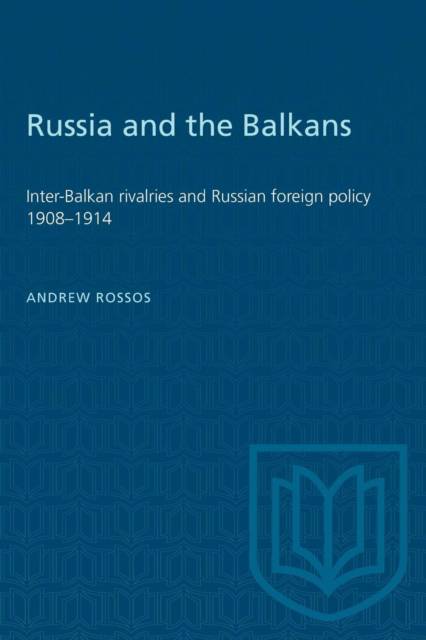
- Retrait gratuit dans votre magasin Club
- 7.000.000 titres dans notre catalogue
- Payer en toute sécurité
- Toujours un magasin près de chez vous
- Retrait gratuit dans votre magasin Club
- 7.000.0000 titres dans notre catalogue
- Payer en toute sécurité
- Toujours un magasin près de chez vous
59,95 €
+ 119 points
Description
Russia had traditionally been attracted to the Balkan region for strategic, ideological, and economic reasons. This volume presents an objective diplomatic history focused on five crucial years in the relations between Russia and the Balkan states from the Annexation Crisis of 1908-9 to the outbreak of the FIrst World War.
Internal instability, political and military weakness, and the strong opposition of the other great powers, particularly after the Crimean War, forced Russia to co-ordinate her policy with the wishes of the Concert of Europe. She was compelled to collaborate with Austria-Hungary, her chief antagonist in the Balkans, in preseving the status quo, while she awaited a more opportune moment for an independent policy.
Professor Rossos centres his study on the attempts of the Balkan states to combine and administer the coup de grâce to Turkey and block Austro-Hungarian encroachments to the south. The jockeying for position of the great powers of the Triple Alliance and the Triple Entente, which formed the nucleus of the alliances of the First World War, is an underlying theme.
Vacillating Russian policy was torn over irreconcilable issues that divided the Balkan states. The Balkan nations created a system of alliances aimed at ending Ottoman rule in the region. However, their conflicting claims for domination of Macedonia undermined their short-lived unity and destroyed the Balkan system of alliances which Russia expected to serve as an instrument of her supremacy in southeast Europe.
The author's familiarity with Slavic languages, Greek, and Western languages enables him to provide complete accounts of the activities of the period, including much new detail. The resulting work brings fresh insights into Balkan rivalries and Russian involvement in the peninsula.
Internal instability, political and military weakness, and the strong opposition of the other great powers, particularly after the Crimean War, forced Russia to co-ordinate her policy with the wishes of the Concert of Europe. She was compelled to collaborate with Austria-Hungary, her chief antagonist in the Balkans, in preseving the status quo, while she awaited a more opportune moment for an independent policy.
Professor Rossos centres his study on the attempts of the Balkan states to combine and administer the coup de grâce to Turkey and block Austro-Hungarian encroachments to the south. The jockeying for position of the great powers of the Triple Alliance and the Triple Entente, which formed the nucleus of the alliances of the First World War, is an underlying theme.
Vacillating Russian policy was torn over irreconcilable issues that divided the Balkan states. The Balkan nations created a system of alliances aimed at ending Ottoman rule in the region. However, their conflicting claims for domination of Macedonia undermined their short-lived unity and destroyed the Balkan system of alliances which Russia expected to serve as an instrument of her supremacy in southeast Europe.
The author's familiarity with Slavic languages, Greek, and Western languages enables him to provide complete accounts of the activities of the period, including much new detail. The resulting work brings fresh insights into Balkan rivalries and Russian involvement in the peninsula.
Spécifications
Parties prenantes
- Auteur(s) :
- Editeur:
Contenu
- Nombre de pages :
- 328
- Langue:
- Anglais
- Collection :
Caractéristiques
- EAN:
- 9781487581169
- Date de parution :
- 15-12-81
- Format:
- Livre broché
- Format numérique:
- Trade paperback (VS)
- Dimensions :
- 156 mm x 234 mm
- Poids :
- 503 g

Les avis
Nous publions uniquement les avis qui respectent les conditions requises. Consultez nos conditions pour les avis.






